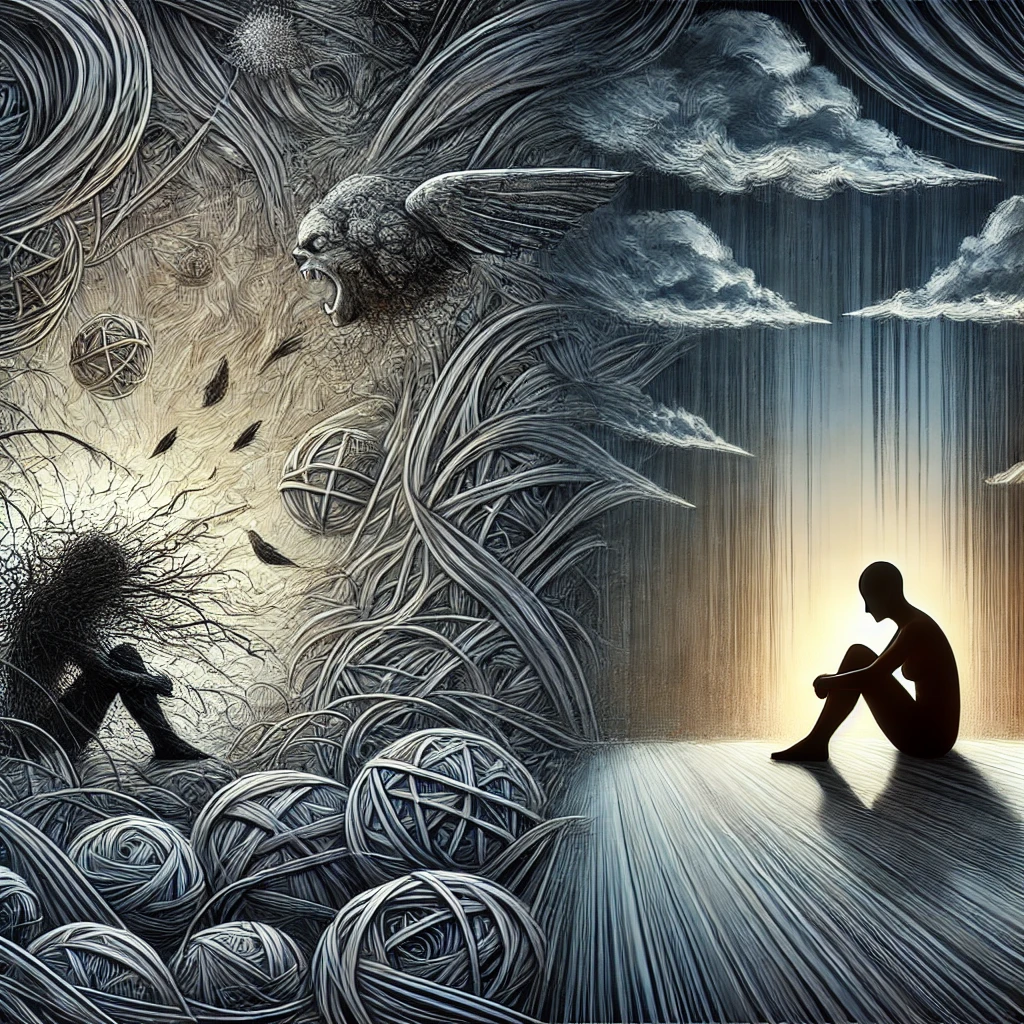
Understanding Anxiety and Depression
Anxiety and depression are two of the most pervasive and misunderstood conditions in modern society. Society often dismisses anxiety and depression as weaknesses, minimizes them as stress, or buries them beneath the weight of stigma. Moreover, it minimizes them as just stress or buries them under the weight of stigma. But these disorders are not just passing emotions—they shape lives, relationships, and entire generations. As a result, understanding anxiety and depression is critical to addressing their impact and fostering healing.
Why Anxiety and Depression Have Always Existed
Historically, anxiety and depression were misunderstood. While society often ridicules or ignores anxiety and depression, in reality, they have existed for as long as humans have had the capacity to feel.
In this article, for instance, we will dive deep into their origins, as well as their impact on individuals, and the stereotypes that keep millions suffering in silence. Therefore, before we can heal, we must first understand.
Mental Health Throughout History
Many people believe mental health struggles are a modern phenomenon. However, historians have documented them for thousands of years. Ancient civilizations documented anxiety and depression under different names. Similarly, each culture attempting to explain them in their own way:
- Ancient Theories of Depression and Anxiety
- Medieval Europe (5th-15th Century): Anxiety and depression were often seen as spiritual afflictions, sometimes even possession by demons. Treatments included fasting, prayer, and, unfortunately, exorcisms.
- 18th-19th Century: The Enlightenment period brought a shift— Consequently, mental health issues were no longer viewed as moral failings but as medical conditions. At the same time, treatment approach began to evolve.
- 20th Century-Present: Advances in neuroscience and psychology have proven that anxiety and depression are legitimate medical disorders, rooted in brain chemistry, genetics, and environmental factors.
- For a deeper look at the history of mental illness, see Bridley & Daffin’s Fundamentals of Psychological Disorders (Bridley & Daffin, 2023).
Despite centuries of documentation, unfortunately, we still struggle with the same issues.
Why?
Because people fear what they don’t understand.
In addition, for further scientific insights into the biological and psychological aspects of anxiety and depression, refer to The Neuroscience of Anxiety and Depression (Shin & Liberzon, 2010).
The First Documented Cases of Anxiety and Depression
Who was the first person diagnosed with anxiety? The first case of depression? While history doesn’t give us a single name, nevertheless, some early cases stand out:
- Anxiety: The philosopher Cicero (106-43 BCE) wrote extensively about feelings of fear, dread, and nervousness—symptoms that align with modern-day anxiety disorders.
- Depression: The Bible’s description of King Saul (circa 1000 BCE) suggests he struggled with deep mood swings, paranoia, and emotional distress—hallmarks of major depressive disorder.
Throughout history, many well-known figures, from Abraham Lincoln to Winston Churchill to Charles Darwin, have struggled with anxiety and depression. Yet, rather than being seen as proof of the condition’s legitimacy, these cases are often romanticized or overlooked.
This brings us to an important question:
Are Anxiety and Depression Legitimate Illnesses?
Some still argue that anxiety and depression are just “mindset problems”. However, they believe people should “snap out of it” or “be more positive.” As a result, this outdated view ignores the overwhelming scientific evidence that proves otherwise:
- Brain chemistry: Studies show that anxiety and depression involve neurotransmitter imbalances (such as serotonin, dopamine, and norepinephrine). Consequently, that affect mood and cognition.
- Genetics: If a family member has an anxiety or depressive disorder, you are more likely to develop one yourself, proving a genetic component.
- Brain imaging: MRI scans of people with depression show reduced activity in parts of the brain responsible for motivation and pleasure.
Anxiety and depression are not personality flaws. They are not just overreactions. They are real, measurable, medical conditions.
After all, why do so many people still dismiss them?
The Stereotypes That Keep People Silent
The stigma surrounding mental illness is one of its deadliest symptoms. Here are some common misconceptions that keep people from seeking help:
- “You just need to think positive.” → This invalidates real pain and ignores the biological nature of mental illness.
- “It’s just stress.” → While stress can trigger anxiety and depression, in contrast, these disorders go far beyond everyday worry or sadness.
- “People in the past didn’t have these issues.” → False. Mental illness existed; it was just hidden, punished, or ignored.
- “Medication is a crutch.” → This disregards the fact that, like physical illnesses, mental disorders often require medical treatment.
Every time someone downplays these conditions, they make it harder for those suffering to get the help they need.
How Anxiety and Depression Cripple Lives
1. Emotional & Mental Toll
- Anxiety keeps the brain in a state of constant worry, making it hard to focus.
- Depression drains motivation, making even small tasks feel overwhelming.
2. Physical Toll
- Anxiety can cause insomnia, heart palpitations, digestive issues, and headaches.
- Depression weakens the immune system, increases pain sensitivity, and contributes to chronic fatigue.
3. Social & Professional Impact
- Anxiety makes social interactions feel like battles, leading to avoidance and isolation.
- Depression affects performance at work or school, sometimes leading to job loss or academic failure.
These disorders don’t just affect the individual—they ripple through families, workplaces, and communities. Even so, despite their seriousness, many people still suffer in silence.
The Path to Healing
Therefore, what can be done? Nevertheless, while there is no “one-size-fits-all” cure, many treatments can help:
1. Therapy
- Cognitive Behavioral Therapy (CBT) helps change negative thought patterns.
- Psychoanalysis explores deep-rooted emotional wounds.
2. Medication
- SSRIs and SNRIs regulate neurotransmitters and can be life-changing for some.
- While not for everyone, medication can be essential for severe cases.
3. Holistic Approaches
- Exercise, diet, and meditation help manage symptoms naturally.
- Journaling and creative expression allow for emotional release.
4. Social Support
- Having a strong support system is crucial in recovery.
- Talking about mental health reduces stigma and normalizes seeking help.
Final Thoughts: What If We Saw Mental Health Differently?
What if, instead of shaming anxiety and depression, we acknowledged them as part of the human experience? What if, instead of dismissing those who struggle, we listened?
The truth is, anxiety and depression do not define a person. They are battles, not identities. And like any battle, they can be fought—with understanding, treatment, and support.
If you or someone you love is struggling, know this: You are not weak. You are not broken. You are not alone.
And most importantly—you deserve help.
In-text Citation
“Research suggests that anxiety is deeply linked to neurotransmitter imbalances and physiological responses in the body (Medical News Today, 2023).”
For more insights on anxiety’s physiological effects, see:
Medical News Today. (2023). What to know about anxiety: Causes and treatment. Retrieved from https://www.medicalnewstoday.com/articles/323633#channel-theory

Leave a Reply